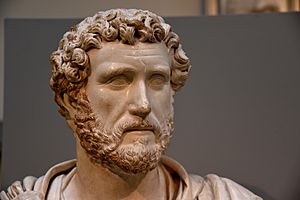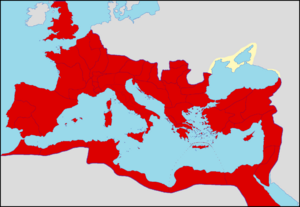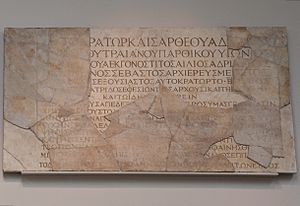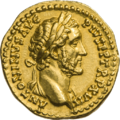Antoninus Pius facts for kids
Quick facts for kids Antoninus Pius |
|||||||||
|---|---|---|---|---|---|---|---|---|---|
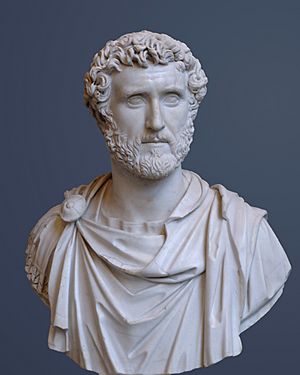
Bust in the Glyptothek, Munich
|
|||||||||
| Roman emperor | |||||||||
| Reign | 11 July 138 – 7 March 161 | ||||||||
| Predecessor | Hadrian | ||||||||
| Successor | Marcus Aurelius and Lucius Verus |
||||||||
| Born | 19 September 86 Lanuvium, Italy |
||||||||
| Died | 7 March 161 (aged 74) Lorium, Italy |
||||||||
| Burial | Hadrian's Mausoleum | ||||||||
| Spouse | Annia Galeria Faustina | ||||||||
| Issue Detail |
|
||||||||
|
|||||||||
| Dynasty | Nerva–Antonine | ||||||||
| Father |
|
||||||||
| Mother |
|
||||||||
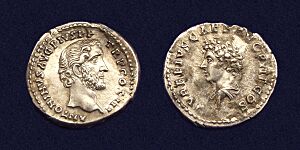
Antoninus Pius (born Titus Aurelius Fulvus Boionius Antoninus; 19 September 86 – 7 March 161) was a Roman emperor who ruled from 138 to 161 AD. He was the fourth of the "Five Good Emperors" from the Nerva–Antonine dynasty.
Antoninus was born into a powerful family. He held several important jobs under Emperor Hadrian. Hadrian adopted Antoninus as his son and successor just before he died. Antoninus earned the nickname "Pius" (meaning "dutiful" or "loyal") after he became emperor. This was likely because he convinced the Senate to declare Hadrian a god. His time as emperor was very peaceful. There were no major rebellions or wars. A successful military campaign in southern Scotland led to the building of the Antonine Wall.
Antoninus was a good leader. He left a lot of money in the government's treasury for the next emperors. He also improved access to clean water and made laws fairer. He died in 161 AD and was followed by his adopted sons, Marcus Aurelius and Lucius Verus, who ruled together.
Contents
Early Life and Family
Growing Up and Family Background
Antoninus Pius was born near Lanuvium (now Lanuvio) in Italy. His father, Titus Aurelius Fulvus, was a Roman consul (a high-ranking official). His family, the Aurelii Fulvi, came from Nîmes in what is now France. They were a new but important family in the Roman Senate.
Antoninus's father died when he was young. So, his maternal grandfather, Gnaeus Arrius Antoninus, raised him. His grandfather was known as an honest and cultured man. Antoninus's mother, Arria Fadilla, later remarried and had two more daughters.
Marriage and Children
Around 110-115 AD, Antoninus married Annia Galeria Faustina the Elder. They had a happy marriage. Faustina was from another important Roman family. She was known for her beauty.
Antoninus and Faustina had four children:
- Marcus Aurelius Fulvus Antoninus (died young)
- Marcus Galerius Aurelius Antoninus (died young)
- Aurelia Fadilla (died in 135 AD)
- Annia Galeria Faustina Minor, also known as Faustina the Younger (125-175 AD). She later became a Roman Empress and married her cousin, Marcus Aurelius.
When Faustina the Elder died in 141 AD, Antoninus was very sad. He asked the Senate to declare her a goddess. He also built a temple for her in the Roman Forum and had coins made with her picture. He started a charity called Puellae Faustinianae (Girls of Faustina) to help poor girls. Antoninus never remarried after Faustina's death.
Becoming Hadrian's Choice
Antoninus was very successful in his early career. He served as a quaestor (financial officer) and praetor (judge). In 120 AD, he became a consul. Emperor Hadrian then chose him to help govern Italy. He also gained a good reputation as governor of the province of Asia.
Hadrian liked Antoninus very much. On February 25, 138 AD, Hadrian adopted Antoninus as his son and successor. This happened after Hadrian's first adopted son, Lucius Aelius, died. Hadrian made Antoninus promise that he would, in turn, adopt two young men: Marcus Annius Verus (who became Marcus Aurelius) and Lucius, the son of Lucius Aelius (who became Lucius Verus). Antoninus accepted these conditions. He then took the name Imperator Titus Aelius Caesar Antoninus, preparing for his rule.
Antoninus Pius as Emperor
When Antoninus became emperor, his full title was Imperator Caesar Titus Aelius Hadrianus Antoninus Augustus Pontifex Maximus. One of his first actions was to convince the Senate to declare Hadrian a god. The Senate had first refused, but Antoninus's efforts likely earned him the title Pius. Another reason for this title might be that he supported his elderly father-in-law at Senate meetings. He also saved people Hadrian had sentenced to death.
Antoninus did not make many big changes when he became emperor. He kept most of Hadrian's arrangements. He built temples, theaters, and tombs. He also supported arts and sciences. He gave awards and money to teachers of public speaking and philosophy.
A Time of Peace
Antoninus Pius's reign was one of the most peaceful times in Roman history. He never even left Italy during his 23 years as emperor. He managed problems in the provinces through his governors or by sending official letters. This way of ruling was highly praised by people at the time.
There were some small military problems in different parts of the Empire. These included areas like Mauretania (North Africa) and Judea. There were also some issues with the Brigantes tribe in Britain. However, these were not as serious as earlier or later revolts.
In Britain, Antoninus decided to take a more active approach. In 139 AD, he appointed a new governor, Quintus Lollius Urbicus. This governor led an invasion of southern Scotland. The Roman army won some important battles and built the Antonine Wall. This wall stretched from the Firth of Forth to the Firth of Clyde. However, the wall was later abandoned in the early 160s.
The Antonine Wall was shorter than Hadrian's Wall. It was only 37 miles long. But the land it enclosed was not very useful. It was hard to supply the wall, and the costs were too high. Some historians think the campaign in Britain was mainly to give Antoninus some military glory at the start of his rule. This was important because he needed to show he was a strong leader.
Antoninus's reign was mostly peaceful, but there were a few attempts by others to take his power. However, Antoninus did not personally punish those involved. He let the Senate handle these cases.
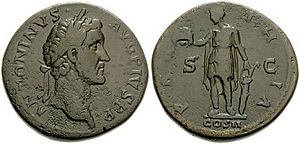
There were also some minor troubles in Dacia (modern Romania). The Greek city of Olbia on the Black Sea coast was defended against the Scythians. In Germany, new forts were built to extend the Roman border. In the East, Rome kept control over Armenia by choosing a new client king in 140 AD.
Antoninus was the last Roman Emperor recognized by Indian kingdoms, like the Kushan Empire. Ambassadors from India, Bactria, and Hyrcania visited him. They had heard about his fairness and good character. Later, under Marcus Aurelius, Rome's focus shifted away from the Far East due to a plague and wars in Europe.
Economy and Government
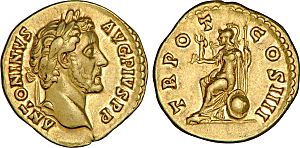
Antoninus was known as a skilled administrator and builder. He expanded access to drinking water by building aqueducts in Rome and other cities. He also built bridges and roads. Despite these projects, he managed to leave a large amount of money in the public treasury. This was a rare achievement for a Roman emperor.
The emperor also stopped collecting taxes from cities hit by natural disasters, like fires or earthquakes. He gave money to help rebuild cities in Greece and Asia Minor after earthquakes. These actions earned him praise from Greek writers. He also gave special privileges to intellectuals like philosophers and teachers.
Antoninus was very interested in religious ceremonies. He supported the worship of the Great Mother and Mithras. In 148 AD, he led the celebrations for Rome's 900th anniversary. These celebrations included grand games where many exotic animals were shown. To pay for these events, Antoninus had to reduce the amount of silver in Roman coins.
Fairer Laws
Antoninus was very interested in making laws fairer across the empire. He wanted local laws to match Roman standards. For example, he ordered that local police should not treat suspects as guilty before a trial. They also had to keep detailed records of their questioning.
Antoninus was not a legal innovator, but he often put humanity and equality first. He introduced new legal ideas based on these values. He was helped by several important lawyers. One of them, Lucius Volusius Maecianus, became his most important legal advisor. Maecianus also taught law to Marcus Aurelius.
Antoninus made rules to make it easier for slaves to gain their freedom. He believed in giving the benefit of the doubt to people claiming to be free. He also punished masters who killed slaves without a trial. He ruled that slaves could be sold to a new master if they were consistently mistreated.
In criminal law, Antoninus introduced the important idea that people accused of crimes should not be treated as guilty before their trial. He also said that trials and punishments should happen where the crime was committed. He limited the use of torture, for example, by generally not allowing it for children under 14. However, he did expand the use of torture in some financial cases.
Death and Legacy
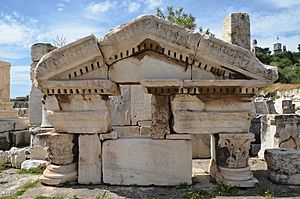
In 156 AD, Antoninus Pius turned 70. He started to feel weaker and needed support to stand. As he got older, Marcus Aurelius took on more and more of the emperor's duties.
Antoninus died on March 7, 161 AD, at his family estate in Lorium, near Rome. Just before he died, he gathered his advisors. He passed the empire and his daughter to Marcus Aurelius. His last word was "aequanimitas," meaning "equanimity" or "calmness." He then died peacefully.
His reign was the second longest in Roman history, after Augustus. It lasted 23 years.
Antoninus Pius had an elaborate funeral. His body was buried in Hadrian's Mausoleum. After his death, Marcus Aurelius and Lucius Verus asked the Senate to declare Antoninus a god. The Senate agreed. A special priest was appointed to lead the worship of the deified Antoninus.
A column was built in his honor in Rome. The temple he had built for his deified wife, Faustina, was rededicated to both Faustina and the deified Antoninus. This temple still stands today as the church of San Lorenzo in Miranda.
How History Sees Him
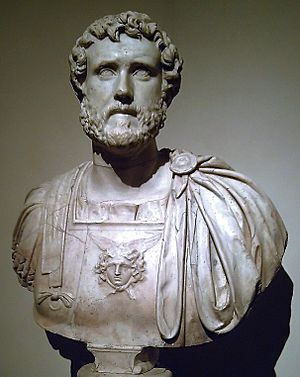
Most of what we know about Antoninus Pius comes from the Augustan History, which is not always reliable. However, it does contain some true information, like the building of the Antonine Wall. Antoninus is unique because there are no other full biographies of him.
Many historians have seen Antoninus as an ideal ruler. He was praised for his peaceful reign and good character. Some historians, however, have a less positive view. They argue that his peaceful reign might have been a missed opportunity to prepare for future conflicts. For example, the Parthians in the East became a problem soon after his death.
However, others argue that Antoninus and his officials did deal with border issues effectively. They believe that Marcus Aurelius's praise for Antoninus was well-deserved. Antoninus was a conservative emperor who avoided bloodshed. He was known for his fairness and religious devotion. His laws helped to remove unfairness and soften harsh rules.
Some scholars also argue that claims of his military weakness are exaggerated. They point to the conquest of the Scottish Lowlands and the expansion of Roman territory in Germany as proof. They also praise him for using diplomacy to prevent wars.
Family Tree
Antoninus Pius had only one child who lived to adulthood, Faustina the Younger. However, through her, he became an ancestor to many important Romans for several generations, including Emperor Commodus.
- Annia Galeria Faustina the Younger (125-175 AD) had several children, including:
- Annia Aurelia Galeria Lucilla (150-182 AD)
- Annia Galeria Aurelia Faustina (151-?)
- Annia Aurelia Fadilla (159-after 211 AD)
- Annia Cornificia Faustina Minor (160-213 AD)
Nerva–Antonine family tree
|
|||||||||||||||||||||||||||||||||||||||||||||||||||||||||||||||||||||||||||||||||||||||||||||||||||||||||||||||||||||||||||||||||||||||||||||||||||||||||||||||||||||||||||||||||||||||||||||||||||||||||||||||||||||||||||||||||||||||||||||||||||||||||||||||||||||||||||||||||||||||||||||||||||||||||||||||||||||||||||||||||||||||||||||||||||||||||||||||||||||||||||||||||||||||||||||||||||||||||||||||||||||||||||||||||||||||||||||||||||||||||||||||||||||||||||||||||||||||||||||||||||||||||||||||||||||||||||||||||||||||||||||||||||||||||||||||||||||||||||||||||||||||||||||||||||||||||||||||||||||||||||||||||||||||||||||||||||||||||||||||||||||||||||||||||||||||||||||||||||||||||||||||||||||||||||||||||||||||||||||||||||||||||||||||||||||||||||||||||||||||||||||||||||||||||||||||||||||||||||||||||||||||||||||||||||||||||||||||||||||||||||||||||||||||||||||||||||||||||||||||||||||||||||||||||||||||||||||||||||||||||||||||||||||||||||||||||||||||||||||||||||||||||||||||||||||||||||||||||||||||
|
|||||||||||||||||||||||||||||||||||||||||||||||||||||||||||||||||||||||||||||||||||||||||||||||||||||||||||||||||||||||||||||||||||||||||||||||||||||||||||||||||||||||||||||||||||||||||||||||||||||||||||||||||||||||||||||||||||||||||||||||||||||||||||||||||||||||||||||||||||||||||||||||||||||||||||||||||||||||||||||||||||||||||||||||||||||||||||||||||||||||||||||||||||||||||||||||||||||||||||||||||||||||||||||||||||||||||||||||||||||||||||||||||||||||||||||||||||||||||||||||||||||||||||||||||||||||||||||||||||||||||||||||||||||||||||||||||||||||||||||||||||||||||||||||||||||||||||||||||||||||||||||||||||||||||||||||||||||||||||||||||||||||||||||||||||||||||||||||||||||||||||||||||||||||||||||||||||||||||||||||||||||||||||||||||||||||||||||||||||||||||||||||||||||||||||||||||||||||||||||||||||||||||||||||||||||||||||||||||||||||||||||||||||||||||||||||||||||||||||||||||||||||||||||||||||||||||||||||||||||||||||||||||||||||||||||||||||||||||||||||||||||||||||||||||||||||||||||||||||||||
| Notes:
Except where otherwise noted, the notes below indicate that an individual's parentage is as shown in the above family tree. |
|||||||||||||||||||||||||||||||||||||||||||||||||||||||||||||||||||||||||||||||||||||||||||||||||||||||||||||||||||||||||||||||||||||||||||||||||||||||||||||||||||||||||||||||||||||||||||||||||||||||||||||||||||||||||||||||||||||||||||||||||||||||||||||||||||||||||||||||||||||||||||||||||||||||||||||||||||||||||||||||||||||||||||||||||||||||||||||||||||||||||||||||||||||||||||||||||||||||||||||||||||||||||||||||||||||||||||||||||||||||||||||||||||||||||||||||||||||||||||||||||||||||||||||||||||||||||||||||||||||||||||||||||||||||||||||||||||||||||||||||||||||||||||||||||||||||||||||||||||||||||||||||||||||||||||||||||||||||||||||||||||||||||||||||||||||||||||||||||||||||||||||||||||||||||||||||||||||||||||||||||||||||||||||||||||||||||||||||||||||||||||||||||||||||||||||||||||||||||||||||||||||||||||||||||||||||||||||||||||||||||||||||||||||||||||||||||||||||||||||||||||||||||||||||||||||||||||||||||||||||||||||||||||||||||||||||||||||||||||||||||||||||||||||||||||||||||||||||||||||||
References:
|
|||||||||||||||||||||||||||||||||||||||||||||||||||||||||||||||||||||||||||||||||||||||||||||||||||||||||||||||||||||||||||||||||||||||||||||||||||||||||||||||||||||||||||||||||||||||||||||||||||||||||||||||||||||||||||||||||||||||||||||||||||||||||||||||||||||||||||||||||||||||||||||||||||||||||||||||||||||||||||||||||||||||||||||||||||||||||||||||||||||||||||||||||||||||||||||||||||||||||||||||||||||||||||||||||||||||||||||||||||||||||||||||||||||||||||||||||||||||||||||||||||||||||||||||||||||||||||||||||||||||||||||||||||||||||||||||||||||||||||||||||||||||||||||||||||||||||||||||||||||||||||||||||||||||||||||||||||||||||||||||||||||||||||||||||||||||||||||||||||||||||||||||||||||||||||||||||||||||||||||||||||||||||||||||||||||||||||||||||||||||||||||||||||||||||||||||||||||||||||||||||||||||||||||||||||||||||||||||||||||||||||||||||||||||||||||||||||||||||||||||||||||||||||||||||||||||||||||||||||||||||||||||||||||||||||||||||||||||||||||||||||||||||||||||||||||||||||||||||||||||
Images for kids
-
Statue of Antoninus Pius in military clothing from the Vatican Museums.
-
Arch of Antoninus Pius in Sbeïtla, Tunisia.
-
Gold aureus coin of Antoninus from 153 AD.
-
Green Roman glass cup found in an Eastern Han Dynasty tomb in China.
See also
 In Spanish: Antonino Pío para niños
In Spanish: Antonino Pío para niños
 | Lonnie Johnson |
 | Granville Woods |
 | Lewis Howard Latimer |
 | James West |


